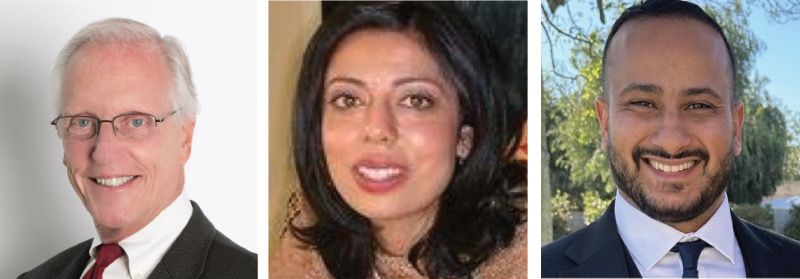Are We Done with Masks?
A recently released study from Cochrane casts doubts on the efficacy of N95 masks and P2 respirators as effective safeguards against COVID infections. Wearing a mask may make little to no difference in how many people caught a flu-like illness/ COVID-like illness, state the researchers, drawing on data from 10 studies.
Some experts, however, say masks continue to be an effective tool in containing the spread of COVID-19 infections. Other experts state that vaccines are the best prevention against infection and that masks are unnecessary.
At an Ethnic Media Services briefing, March 3, speakers – Dr. William Schaffner, Professor of Medicine in the Division of Infectious Diseases at the Vanderbilt University School of Medicine; Dr. Monica Gandhi, Professor of Medicine and Associate Division Chief (Clinical Operations/ Education) of the Division of HIV, Infectious Diseases, and Global Medicine at UCSF/ San Francisco General Hospital; and Dr. Mina Hakim, Pediatrics Specialist, South Central Family Health Center – debated this continuing and contentious issue, and provided advice for keeping children safe amid the ongoing health crisis.

Dr William Schaffner discussed the findings of the Cochrane study and added his own analysis of the conclusions, and his recommendations on whether or not to continue masking.
“The Cochrane Collaboration, named originally after a British epidemiologist by the name of Archie Cochrane, is very rigorous and they do survey the world’s medical literature on topics that are very timely and are under discussion. They are extremely meticulous almost to Chrissy in which studies they will actually include or review.
“Although there are dozens of studies, some large, some small, some better, some not so well designed in the literature. The Cochrane Collaboration finally decided only a very small handful of studies were sufficiently rigorous and even they were not perfect in order to review.
“Most of these studies dealt not with COVID but with influenza and these two viruses although very similar in the way they are transmitted, are not identical. Influenza is transmitted almost exclusively through very close distances. These so-called droplet root Ovid is transmitted the same way but also at a larger distance, the airborne route, and masks differentially protect against the tube. How effective masks are, not in the health care, but in the community environment? The Cochrane collaboration, for all the reasons I’ve said, comes out with a very conservative cautious evaluation,” said Dr Schaffner.
“We all know that cloth masks are worthless, we should not wear them. The blue surgical masks prevents the surgeon from having bacteria go into the wound as they are working. Not exactly the same circumstance as COVID and influenza, and RSV infection, so here we are in the community should we be wearing a mask?
“I would recommend older persons, when they are out in the community, in group settings indoors, religious services, going to a basketball game, going to some sort of a convention, and the like, to wear a KN-95 or N-95 mask. Anyone with a notable underlying serious disease that we know predisposes to serious COVID and influenza namely, heart disease, lung disease, diabetes, for example, pregnant women. In addition, anyone who is moderately or seriously immune compromised because of either their underlying illness or because of an immunocompromising medication they are taking, it’s a personal decision, though I think masks do offer a small but finite additional layer of protection to protect themselves when they are in such vulnerable circumstances,” said Dr Schaffner.
Dr Monica Gandhi
“I am completely in agreement with Dr Schaffner that vaccines are actually the strongest form of protection against severe disease from COVID-19 and have been very impressed with the vaccine effectiveness, and the end, and where we are in this pandemic,” said Dr Gandhi.
“I was very interested in masks for the first year of the pandemic and wrote a piece in spring of 2020 for the New England Journal really urging masks, but my interest in masks were around the concept of masking and reducing the severity of disease.
“If you’re getting in less virus, the theory was that, could you have last synoculum and would there be less severe disease? There are some data that supports that, but the question on the table now is whether there’s enough evidence that masks reduce transmission at a population level to impose mass mandates?
“I think that the Cochrane review was not just stated during influenza, actually they were very careful to look at studies during COVID and they are very rigorous and considered RCTs or randomized controlled data, the highest level of evidence, that they were going to review to make a recommendation that or to a determine mass mandates made a difference.
“There are three major randomized controlled trials that were performed during this pandemic. One was in Denmark early on about individual level masking called The Dan Mask Study that showed no effectiveness of masks.
“We need a cluster randomized study to look at this question we need to randomize villages, or towns, or big groups, to wearing masks versus not, and that was actually performed as Bangladesh RCT of masking at a population level cluster randomized trial providing mass teaching on masks to one village. Everyone’s wearing the same mask so they’re all wearing it versus not, and there was very little effectiveness.
“Cloth masks made no difference. Cloth is not the right way to stop transmission and surgical masks were a bit better. There was a small effectiveness for the villages that wore surgical masks probably because surgical masks are made out of polypropylene material which are negatively charged, they reject the virus, but to be fair, a re-analysis of the Bangladesh data said, ‘no there’s no effectiveness and that RCT was what did not show the effectiveness of population level masking.
“Finally there was one in in Guinea Basu recently. No effectiveness but that was cloth masks so where do we stand then for the pandemic at this moment?
“I don’t think we can impose mass mandates on the public anymore. This is not enough level of evidence to mandate. Let’s make it a personal choice at this point,” said Dr Gandhi.
“We can encourage vulnerable populations, if they’d like to, to mask with the physical science study data, but I don’t think it can be mandated,” said Dr Gandhi.
Dr Mina Hakim
Dr Hakim discussed the findings of the study as they relate to children.
“The Cochrane study did look at a few studies that were children specific. These results were even worse. The limitation of you wearing masks is how to use it,” said Dr Hakim.
“Masks are a mode of prevention that in theory is an excellent mode of prevention, but in practice, it’s not.
“We shouldn’t force children into wearing masks. I think, we should educate them that mask is a small puzzle, a small piece of a very large puzzle, we would encourage to do vaccinations and other measures.
“There are kids that have asthma, immunocompromise or one type of disease or another, I would encourage the parents with these kids to have that conversation with their kids and continue wearing a well-fitted N-95 mask,” said Dr Hakim.
“Not just N-95 but FFP2S, KN, KF-94, and KN-95s had really good protection,” added Dr Gandhi.


